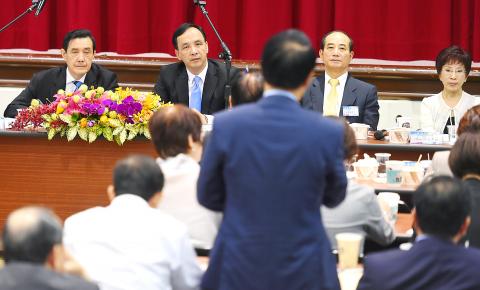The Chinese Nationalist Party (KMT) government will prioritize passage of a cross-strait agreement on double taxation avoidance as well as bills on the budget, government restructuring and an all-volunteer military in the fall legislative session, Premier Mao Chi-kuo (毛治國) said yesterday.
Mao said the Cabinet would also push a special budget bill to finance a river basin management plan, an amendment to encourage small and medium-sized enterprises to raise wages for their employees and legislation promoting industrial innovation.
He listed the government’s priorities at a forum held by the KMT’s Policy Committee to discuss the legislature’s operations and coordination with the government before the new session begins today.

Photo: Chang Chia-ming, Taipei Times
President Ma Ying-jeou (馬英九), Legislative Speaker Wang Jin-pyng (王金平), KMT Chairman Eric Chu (朱立倫) and Deputy Legislative Speaker Hung Hsiu-chu (洪秀柱), who is the party’s presidential candidate, were all present at the forum.
Among the government’s top priorities is the ratification of an agreement between Taiwan and China that aims to protect Taiwanese businesses with operations in China from paying taxes on the same income on both sides of the Taiwan Strait.
The double taxation avoidance agreement was signed last month by Taiwan’s Straits Exchange Foundation Chairman Lin Join-sane (林中森) and China’s Association for Relations Across the Taiwan Straits Chairman Chen Deming (陳德銘) on behalf of their respective governments.
Ministry of Finance officials last month said that the pact would reduce the tax burden of Taiwanese companies and also offer an incentive for foreign companies to set up operations in Taiwan.
Meanwhile, KMT lawmakers at the forum called on party heavyweights to improve cooperation and solidarity before the January presidential and legislative elections, to avoid putting the party’s chances at risk.
KMT Legislator Lin Yu-fang (林郁方) said that despite the Democratic Progressive Party’s internal bickering, it at least presented a united front during elections.
On the other hand, polling revealed that no one believes the KMT has the same willingness to maintain solidarity, he said.
“Legislators are often the ones sacrificed, because our party’s heavyweights cannot work together,” Lin said, adding that he hoped the KMT’s principals would be able to talk things out.
The president said he fully supported the idea and would “do everything in my power, wherever I am needed.”
Chu said solidarity was important, adding that everyone at the forum was considered a “member of the upper echelon of the party.”
“We must work together in order for our 880,000 members to be united in purpose,” Chu said, adding that only then would the party get the support it needs.
Wang said coordinated efforts by the Cabinet, the legislature and the KMT to push the bills through would be very helpful to the party’s chances in the January polls.

Tropical Storm Gaemi strengthened into a typhoon at 2pm yesterday, and could make landfall in Yilan County tomorrow, the Central Weather Administration (CWA) said yesterday. The agency was scheduled to issue a sea warning at 11:30pm yesterday, and could issue a land warning later today. Gaemi was moving north-northwest at 4kph, carrying maximum sustained winds near its center of up to 118.8kph and gusts of 154.8kph. The circumference is forecast to reach eastern Taiwan tomorrow morning, with the center making landfall in Yilan County later that night before departing from the north coast, CWA weather forecaster Kuan Shin-ping (官欣平) said yesterday. Uncertainty remains and

SEA WARNING LIKELY: The storm, named Gaemi, could become a moderate typhoon on Wednesday or Thursday, with the Taipei City Government preparing for flooding A tropical depression east of the Philippines developed into a tropical storm named Gaemi at 2pm yesterday, and was moving toward eastern Taiwan, the Central Weather Administration (CWA) said. Gaemi could begin to affect Taiwan proper on Tuesday, lasting until Friday, and could develop into a moderate typhoon on Wednesday or Thursday, it said. A sea warning for Gaemi could be issued as early as Tuesday morning, it added. Gaemi, the third tropical storm in the Pacific Ocean this typhoon season, is projected to begin moving northwest today, and be closest to Taiwan on Wednesday or Thursday, the agency said. Today, there would likely

DISRUPTIONS: The high-speed rail is to operate as normal, while several airlines either canceled flights or announced early departures or late arrivals Schools and offices in 15 cities and counties are to be closed today due to Typhoon Gaemi, local governments announced last night. The 15 are: Taipei, New Taipei City, Taoyuan, Tainan, Keelung, Hsinchu and Kaohsiung, as well as Yilan, Hualien, Hsinchu, Miaoli, Chiayi, Pingtung, Penghu and Lienchiang counties. People should brace for torrential rainfall brought by the storm, with its center forecast to make landfall on the east coast between tonight and tomorrow morning, the Central Weather Administration (CWA) said. The agency issued a sea warning for the typhoon at 11:30pm on Monday, followed by a land warning at 11:30am yesterday. As of

CASUALTY: A 70-year-old woman was killed by a falling tree in Kaohsiung as the premier warned all government agencies to remain on high alert for the next 24 hours Schools and offices nationwide are to be closed for a second day today as Typhoon Gaemi crosses over the nation, bringing torrential rain and whipping winds. Gaemi was forecast to make landfall late last night. From Tuesday night, its outer band brought substantial rainfall and strong winds to the nation. As of 6:15pm last night, the typhoon’s center was 20km southeast of Hualien County, Central Weather Administration (CWA) data showed. It was moving at 19kph and had a radius of 250km. As of 3pm yesterday, one woman had died, while 58 people were injured, the Central Emergency Operation Center said. The 70-year-old